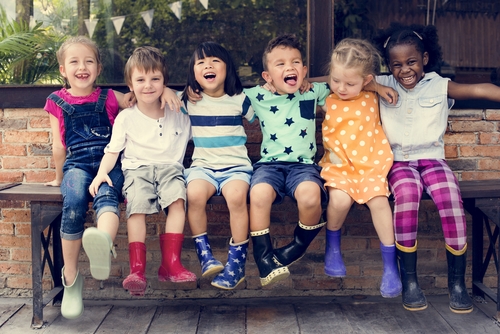
Blog

How To Teach Kids About Friendship
It’s very important in early childcare to question how to teach kids about friendship so that they can build and sustain healthy relationships as they grow older in life. Young children are keen on the idea of friends but sometimes how they treat them is off the mark. We don’t often think about why we label other people as friends. It’s probably because we want them to become what we think the word ‘friends’ symbolizes.
Friendship means allyship. It signifies a mutually beneficial relationship between two or more people. In some cultures, friendship implies an exchange. A lot of parents may think that, “Well, you can’t be friends with the whole world”, but in a classroom setting the teacher needs to set a friendly classroom culture so that lessons run smoothly. Sure, some relationships may be unhealthy, but it’s worth remembering that a happy classroom is a healthy classroom and from a teacher’s perspective it’s worth doing all you can to sustain as many friendships between children as possible.
Sometimes teaching friendship is a matter of guiding two people towards one another. Other times it involves repatriation. Children at a preschool age don’t have the social toolkit they need to navigate conflict and solve issues before they escalate to a point of hurt feelings. Teaching kids to get along is a matter of leveraging kids’ desperation to be recognised as individuals while helping them to navigate their shortcomings and miscommunications.
There are several methods you can use to teach children to behave appropriately with one another:
Friends can stay mad at each other. “You’re not my friend any more” is a common refrain amongst children. It’s good to emphasize that being upset with someone can more often than not be temporary and that getting mad at friends is normal. We teach children that their angry emotional state is normal and that its necessary to forgive one another.
Friends don’t always have to play together. Within an education setting, friendships can be very fluid. It’s perfectly normal for children to move between groups and it doesn’t have to hurt anyone’s feelings. Just because two kids aren’t playing one day does not mean they are no longer friends. Communication can help validate transitions such as these and ensure kids remain positively inclined towards each other.
Friends can have other friends. It’s OK to have a wide friends circle. Sometimes kids play with their closest friends and sometimes they play with other people. Kids should be encouraged to introduce their friends to one another and explain that they’re all friends. Doing so fosters communication skills that are very valuable later in life.
Dealing with misnomers when it comes to exemplary behaviour is a matter of taking direct action. Kids will reflect your emotional state so it’s wise to avoid any unruly outbursts in front of children. Set high expectations and if they’re not met be sure to enforce your will with both positive and negative reinforcement. Show a kid in trouble that you care about them and the rest of the class will empathise too.
If you’re looking to enrol your kids in an early childhood educational program, contact our child care team today. We’re open for business between 7:00 and 6:00pm Monday to Friday. Call us on (02) 9826 0266 to arrange a tour of our premises or to ask any questions about our school. We eagerly await hearing from you when the time is right to commence your children’s early education.
